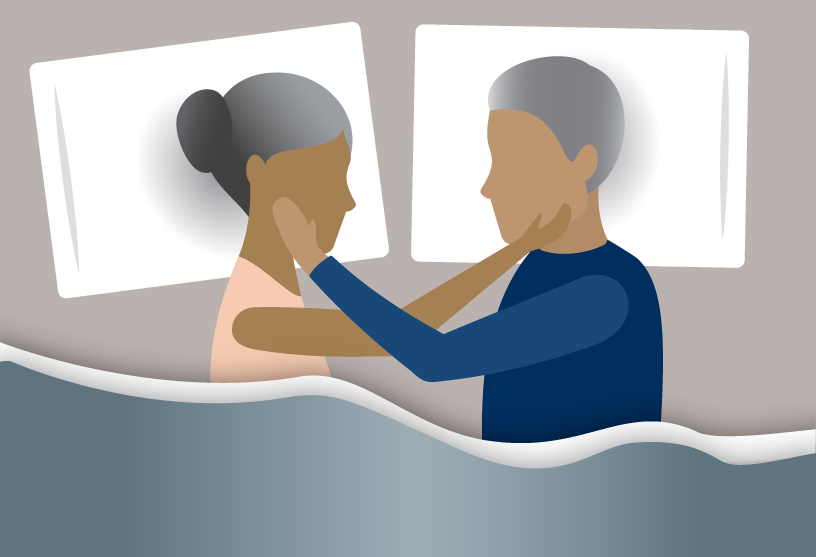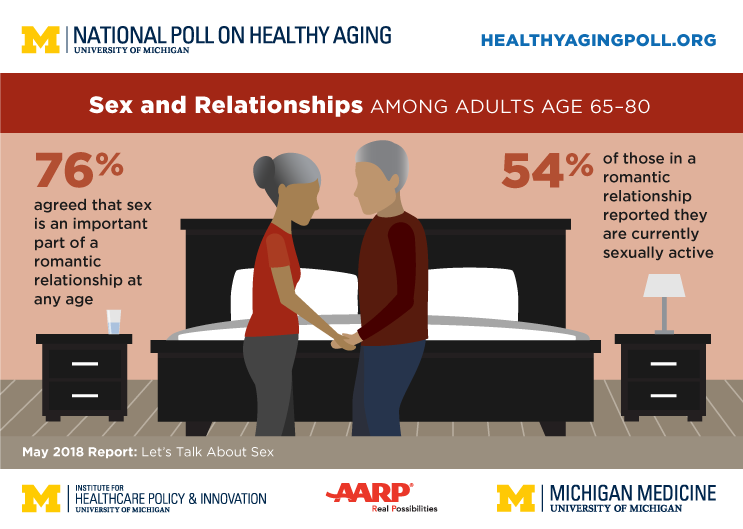 I'm often complaining that little is known about our age group's sexual behavior and beliefs because no one asks us. So I was delighted to learn that researchers at the University of Michigan surveyed 1,002 people between 65 and 80 about their sex lives as part of the National Poll on Healthy Aging 2018. The report, titled "Sex after 65. Health, gender differences, and lack of communication," was released on May 3, 2018.
I'm often complaining that little is known about our age group's sexual behavior and beliefs because no one asks us. So I was delighted to learn that researchers at the University of Michigan surveyed 1,002 people between 65 and 80 about their sex lives as part of the National Poll on Healthy Aging 2018. The report, titled "Sex after 65. Health, gender differences, and lack of communication," was released on May 3, 2018.Here are some of the findings:
- 40 percent of people between the ages of 65 and 80 are sexually active.
- 54 percent of those with a partner are sexually active.
- Nearly 2/3 of older adults say they’re interested in sex.
- More than 50% say sex is important to their quality of life.
- 73 percent said they are satisfied with their current sex life.
- 18 percent of older men and 3 percent of older women say they’ve taken medications or supplements to improve sexual function in the past two years.
- Only 17 percent of older adults said they have talked with their doctor or other health care provider about sexual health in the past two years.
- Those between the ages of 65 and 70 were nearly twice as likely as those in their late 70s to be sexually active.
- 50% of men but just 12 percent of women aged 65 to 80 said they were extremely or very interested in sex.
As I read this, I kept asking myself how they defined sex or sexually active or sex lives. Did sex with a vibrator, a partner's hand or mouth, or one's own hand count as sexually active or having a sex life? (I say yes.) I asked Erica Solway, Ph.D., co-associate director of the poll, who told me,
We did not define sex because we wanted the response to be based on the individual’s definition of what constitutes sex (or their sex life or being sexually active) from their own perspective. We felt this was important, but it does mean that we do not have information on what activities people were referring to when they reported they were or were not sexually active. It’s possible that two people engaged in the same activities may have responded to the questions differently based on their personal definition.
I agree that our own definition of what constitutes sex is important in a study like this -- I applaud this, in fact. But I would have liked that clearer in the poll questions. For example, "Are you currently sexually active?" could have been worded, "Do you engage in sexual activity?" That may sound almost the same, but I have a hunch that many people would interpret the first question as "Do you have sex with a partner?" and the second as "Do you have sex, either with a partner or with yourself?" Asking the question differently would have raised the percentage of people who answered yes to that question, seems to me.

What do you think, readers? Am I off base? How would you interpret the question, "Are you currently sexually active?" (Please answer in the comments section.)
The wording of the questions is a minor quibble, though, because I understand that the poll was multiple-choice, not essay questions, and answered online, not via an interview. In the end, I'm happy that someone's asking.
This report was all over the news. Here are some of the headlines:
- CNN: "Seniors, new poll says, are still sexy after all these years"
- USA Today: "Seniors and sex: Many adults ages 65-80 are having sex (and most are pretty satisfied)"
- US News: "Study: Many Adults Ages 65 to 80 Continue to Be Sexually Active"
- The Guardian: "Sex a key part of life for people over 65, study says"
- Bustle: "The Sex Lives Of People Over 65 Are Thriving, Study Finds, So There's Finally Something to Look Forward To"
Thank you, University of Michigan Institute for Healthcare Policy and Innovation, for conducting the study, and AARP and Michigan Medicine, U-M’s academic medical center, for sponsoring it. Let's keep talking.
No comments:
Post a Comment